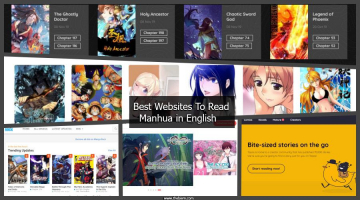Top 10 Best Websites to Read Academic Journals
In the era of digital information, accessing academic journals has never been easier, thanks to a multitude of websites dedicated to scholarly research. To ... read more...discuss this topic, Toplist will delve into a curated selection of the best websites for reading academic journals, where the pursuit of knowledge knows no bounds.
-
Research Gate, being number one on the list of the best websites to read academic journals, is also a valuable resource for accessing academic journals and scholarly publications. Founded in 2008, it has grown into a robust platform that connects millions of researchers worldwide while providing an extensive repository of academic content.
Researchers and academics often share their published papers and articles on Research Gate, making it an excellent resource for those seeking scholarly literature. Users can search for academic journals, research papers, conference papers, and other publications in various fields, from the natural sciences to the social sciences and beyond.
The platform's user-friendly interface and search functionality make it easy for users to discover and access academic content relevant to their research interests. Furthermore, Research Gate encourages collaboration and discussion among researchers, fostering a sense of community and knowledge exchange.
While Research Gate is not a publisher itself, it serves as a valuable bridge between researchers and the wealth of academic knowledge available on the platform. Research Gate offers a wealth of academic journals and publications to aid your quest for knowledge and information.
Link website: https://www.researchgate.net/

Screenshot of https://www.researchgate.net/ Video by Sean Anderson -
JSTOR is a renowned digital library that provides access to a vast collection of academic journals, books, and primary source materials. Founded in 1995, it has emerged as one of the best websites to read academic journals for scholars, researchers, and students seeking scholarly literature across diverse fields.
JSTOR hosts an extensive archive of academic journals, making it a repository of choice for accessing peer-reviewed articles and publications. It covers a broad spectrum of disciplines, including the humanities, social sciences, natural sciences, and more. The platform's impressive collection spans centuries, allowing users to explore historical and contemporary research alike.
One of JSTOR's notable features is its commitment to preserving academic content. It offers a deep archive of scholarly journals, ensuring that older research remains accessible alongside current scholarship. The platform's user-friendly interface and search functionality simplify the process of discovering and retrieving academic articles and journals.
JSTOR stands as a pillar of academic research, offering a wealth of knowledge that supports both educational and research endeavors. It plays a vital role in facilitating the dissemination of scholarly information, making it an invaluable resource for the global academic community.
Link website: https://www.jstor.org/
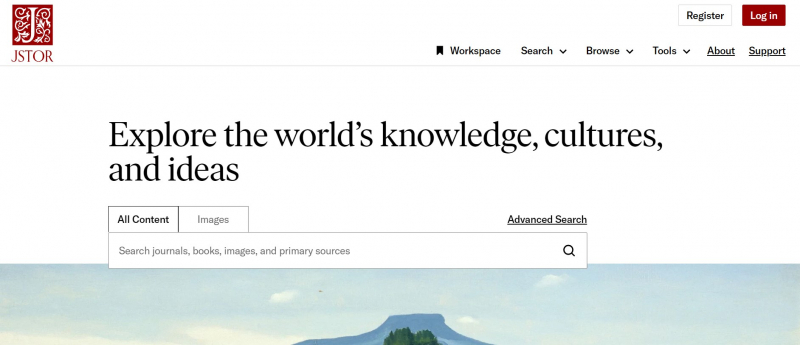
Screenshot of https://www.jstor.org/ Video by JSTOR -
The arXiv e-Print Archive is a prominent digital repository that focuses on the dissemination of preprints, which are early versions of research papers, often prior to formal peer review and publication. Established in 1991, arXiv primarily serves the fields of physics, mathematics, computer science, and related disciplines.
ArXiv provides a platform for researchers to rapidly share their findings with the global scientific community. Users can access a vast collection of research papers and academic journals, ranging from groundbreaking discoveries to ongoing research projects. The repository promotes open access to scientific knowledge, fostering collaboration and the exchange of ideas among scholars.
Its user-friendly interface and extensive categorization by subfields enable easy navigation and access to relevant research. ArXiv plays a crucial role in accelerating the pace of scientific advancement by allowing researchers to share their work openly, gather feedback, and establish priority for their discoveries.
Link website: https://arxiv.org/
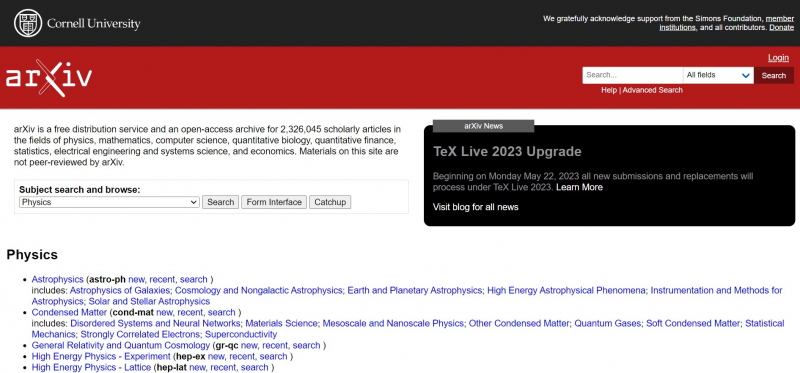
Screenshot of https://arxiv.org/ Video by Life Around Science -
BioMed Central (BMC) is a prominent publisher of open-access academic journals and a pioneer in the movement toward open science. Founded in 2000, BMC is dedicated to providing unrestricted access to high-quality scientific research across a wide range of disciplines within the life sciences, including biology, medicine, genetics, and environmental science.
BMC's open-access model ensures that research articles and academic journals are freely available to the global scientific community, promoting transparency and collaboration in scientific endeavors. The platform hosts a vast collection of peer-reviewed journals, each dedicated to specific areas of research, such as BMC Biology, BMC Medicine, and BMC Genomics, among others.
Researchers, scholars, and students benefit from BMC's commitment to open science by gaining access to cutting-edge research, fostering innovation, and facilitating the dissemination of knowledge. BMC's user-friendly interface and robust search capabilities simplify the process of discovering and accessing scholarly content.
In a world where the sharing of scientific knowledge is paramount, BioMed Central plays a pivotal role in advancing research, improving healthcare, and addressing global challenges by making academic journals and research articles freely accessible to all who seek to expand their understanding of the life sciences.
Link website: https://www.biomedcentral.com/
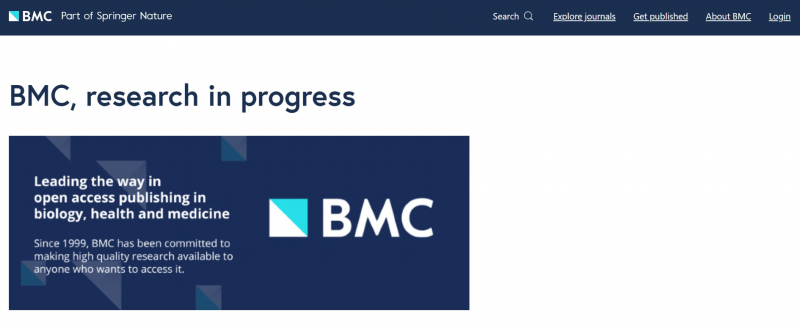
Screenshot of https://www.biomedcentral.com/ Video by BMC -
The Library of Congress, though renowned for its extensive collection of books, manuscripts, and historical documents, is not typically associated with hosting academic journals. Instead, it primarily serves as the largest library in the United States and houses a diverse array of materials, including rare books, maps, photographs, and recordings, which researchers and scholars can access for their academic work.
While the Library of Congress doesn't directly publish academic journals, it plays a crucial role in supporting research by providing access to an unparalleled wealth of resources. Researchers and academics can explore its vast collections, access primary source materials, and utilize the library's specialized research centers and reading rooms.
For those engaged in academic research, the Library of Congress serves as one of the best websites to read academic journals for conducting historical, cultural, and interdisciplinary studies. Its holdings encompass a broad spectrum of topics and offer unique insights into the nation's history and culture, making it an essential destination for scholars seeking to deepen their understanding through access to a rich tapestry of historical and cultural materials.
Link website: https://www.loc.gov/

Screenshot of https://www.loc.gov/ Video by Library of Congress -
Semantic Scholar is a cutting-edge academic search engine and research discovery platform designed to streamline access to scholarly literature across various disciplines. Launched in 2015, it harnesses the power of artificial intelligence and natural language processing to facilitate efficient and comprehensive research.
Semantic Scholar boasts a vast collection of academic journals, research papers, and conference proceedings, offering users a wealth of scholarly resources. Its advanced algorithms extract and display key information, such as citations, references, and figures, enhancing the research experience.
What sets Semantic Scholar apart is its ability to identify influential and groundbreaking research papers, aiding researchers in pinpointing seminal work in their fields. Additionally, it provides features like personalized recommendations and research trends, helping scholars stay up-to-date and make informed decisions about the relevance of academic journals and articles.
For researchers, academics, and students seeking a powerful tool to navigate the ever-expanding landscape of academic literature, Semantic Scholar offers an intelligent and user-friendly solution, making the quest for knowledge and discovery more efficient and accessible.
Link website: https://www.semanticscholar.org/
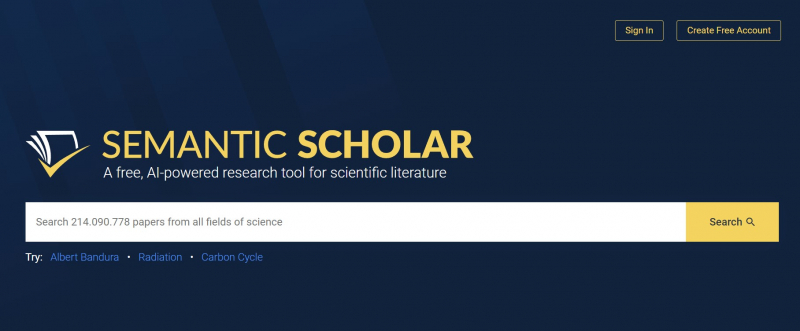
Screenshot of https://www.semanticscholar.org/ Video by Semantic Scholar -
WorldCat is a global catalog that aggregates the collections of thousands of libraries worldwide, making it one of the most extensive resources for academic research materials, including academic journals. Established in 1971, WorldCat allows users to search for books, articles, multimedia materials, and more, providing comprehensive access to a vast array of scholarly resources.
One of WorldCat's primary strengths is its ability to connect researchers and students to academic journals and research papers available in libraries worldwide. Users can discover and access these resources even if their local library does not hold them. WorldCat's interlibrary loan service further facilitates access to academic journals by allowing users to request materials from other libraries.
With its user-friendly interface and robust search capabilities, WorldCat serves as one of the best websites to read academic journals for academics, researchers, and students. It exemplifies the collaborative nature of libraries and their commitment to making academic resources widely accessible.
Link website: https://www.worldcat.org/
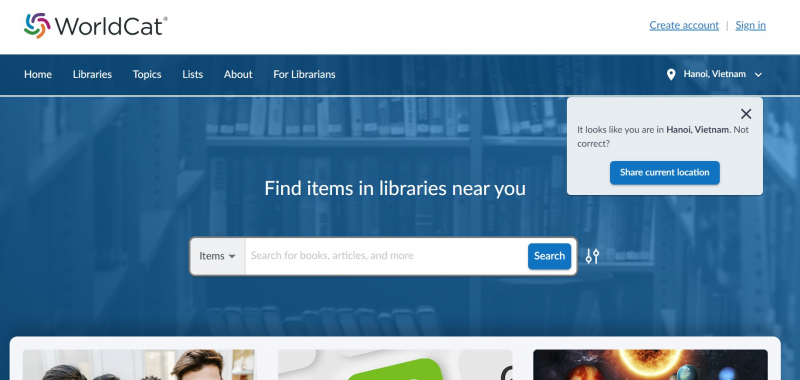
Screenshot of https://www.worldcat.org/ Video by Book Launchers -
CORE, or Connecting Repositories, is a groundbreaking academic search engine and repository aggregator that provides access to millions of open-access research papers and academic journals. Launched in 2013, CORE is a powerful resource for researchers, scholars, and students worldwide.
CORE aggregates content from a wide range of sources, including institutional repositories, subject-specific repositories, and open-access journals. Its vast collection spans various disciplines, offering a wealth of scholarly resources covering diverse topics.
What sets CORE apart is its commitment to open access, ensuring that users can freely access and download academic papers and journal articles. The platform's advanced search features and filters allow for precise and efficient research, while its recommendation system assists users in discovering relevant scholarly content.
CORE exemplifies the principles of open science and open access, fostering collaboration, innovation, and the dissemination of knowledge. For academics seeking an inclusive and comprehensive source of academic journals and research papers, CORE stands as a vital resource, promoting accessibility and the democratization of scholarly information.
Link website: https://core.ac.uk/
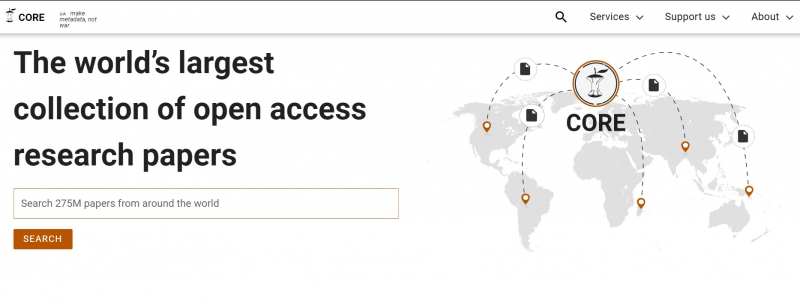
Screenshot of https://core.ac.uk/ Video by CORE -
The Social Science Research Network (SSRN) is a prominent online repository and collaborative platform that specializes in the dissemination of academic research in the field of social sciences. Established in 1994, SSRN has become a vital resource for researchers, scholars, and academics seeking to share and access cutting-edge research papers, working papers, and academic journals.
SSRN hosts a vast collection of research materials, including preprints, conference papers, and peer-reviewed journal articles, across various social science disciplines such as economics, law, psychology, and more. Its user-friendly interface and search functionalities facilitate easy access to a wealth of scholarly content.
One of SSRN's notable features is its rapid dissemination of research, allowing academics to share their findings quickly with the global academic community. This emphasis on open access and swift information sharing has made SSRN an essential platform for collaborative research and knowledge exchange in the social sciences.
SSRN offers a valuable resource for staying informed about the latest developments, accessing academic journals, and participating in scholarly discourse, making it a cornerstone in the realm of academic dissemination in the social sciences.
Link website: https://www.ssrn.com/
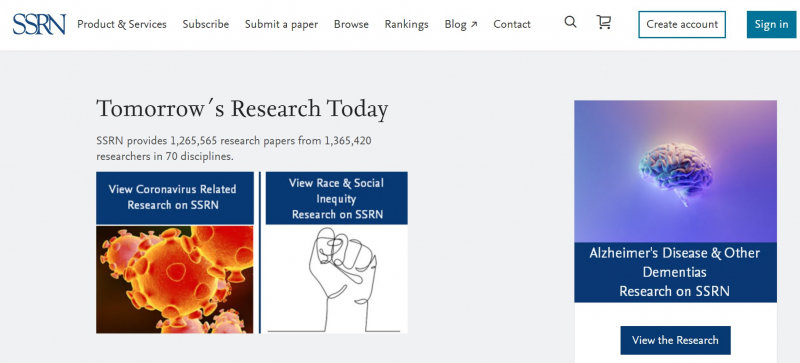
Screenshot of https://www.ssrn.com/ Video by Elsevier - SSRN -
The Public Library of Science (PLOS) is a groundbreaking nonprofit publisher and advocacy organization committed to open access in scientific research. Founded in 2000, PLOS has transformed the landscape of academic publishing by promoting the availability of scientific knowledge to all.
PLOS publishes a wide range of peer-reviewed open-access academic journals, encompassing disciplines such as biology, medicine, genetics, and more. Its commitment to open access means that research articles and academic journals are freely accessible to researchers, scholars, and the general public.
What sets PLOS apart is its dedication to transparency and collaboration in scientific research. It promotes open data sharing and encourages researchers to publish all of their findings, thereby accelerating the pace of scientific discovery and innovation.
PLOS exemplifies the principles of open science by making academic journals and research articles widely accessible and fostering a global community of researchers committed to the open exchange of knowledge. For those seeking open-access academic journals and research in various scientific fields, PLOS stands as a pioneering and influential resource in the world of scholarly publishing.
Link website: https://plos.org/
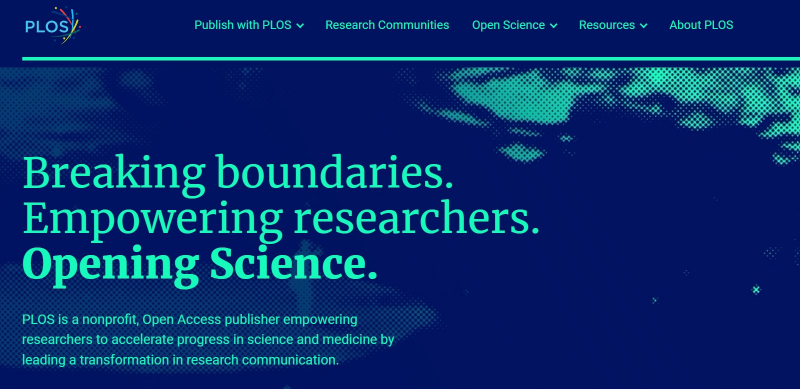
Screenshot of https://plos.org/ Video by The Charles H. Trout Library
























